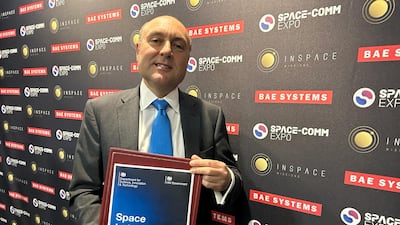The UK Minister for Science, Research and Innovation will visit the UAE in the near future to strengthen the ties between the two countries' space industries.
Speaking to The National at the Space Comm Expo in Farnborough, near London, Andrew Griffith said that it was his job as space minister to be a "door-opener and partnership-former with as many emerging space powers as we can".
Mr Griffith will be on well-trodden ground, because the space relationship between the UK and the UAE is already a close one.
Last year, AzurX, a Dubai-based space investment and advisory company, joined forces with AstroAgency, which is based in Edinburgh, to create a “space bridge” between the UK and Gulf countries.
Each was awarded £75,000 ($95,628) by the UK Space Agency as part of its International Bilateral Fund that aims to boost international partnerships.
Earlier this week, Mr Griffith visited Saudi Arabia, where he signed an agreement covering a range of areas of co-operation, from life sciences to the space industry, and said he is "planning a similar visit to the UAE in the coming months".
Mr Griffith told The National that Saudi Arabia's aspirational space industry looks at the UK and sees "strong capability" and one of the world's "leading space nations".
"One of the ambitions of Saudi Arabia is a moonshot, literally in this case, to have a permanent base on the Moon by 2040.
"To achieve that, they will want to partner with people who've got deep capability, whether that's sensors or potentially a nuclear power plant.
"All of this technology, they see the UK as having capability in that."
Earlier Mr Griffith had told delegates gathered for the Space Comm conference that the government wants the UK space industry to export more and that the domestic market is never going to be big enough for Britain's ambitions in space.
"Our ambitions should be high and they should be global," he told The National.
"As in most successful British industries, whether it's pharmaceuticals or financial services, we can punch above our weight globally.
'Space Budget'
In his budget on Wednesday, UK Chancellor Jeremy Hunt announced the launch of the full Connectivity in Low Earth Orbit (C-Leo) programme, which built on the initial £15 million C-Leo call that was announced in his autumn statement last year.
C-Leo is designed to release £160 million in funding over the next four years to boost the UK's competitiveness in building the next generation of satellites.
Mr Hunt also announced £10 million of funding to the SaxaVord Spaceport to support a first orbital launch this year.

Mr Griffith told The National that during tight economic times, it was positive that the Treasury signalled its continuing plan to provide as much support to the UK's space industry as possible.
"I was really pleased that we were one of very few departments that in the context of having to make difficult decisions and the importance of reducing inflation and achieving the objective of having debt falling in the final year of the plan, that nevertheless this was a budget for space.
"Continuing the levels of investment that the UK government is making in space, alongside a very significant £1.8 billion commitment to ESA [European Space Agency] over five years, there's a good level of funding and I would expect if we continue see the ecosystem grow, we continue to have good actionable ideas, then together with ourselves and international partners, I'd expect the UK industry to grow."
Mr Griffith also announced the launch of the UK government's Space Industrial Plan at Space Comm on Thursday, which brings together agencies and companies in the British space industry to deliver increased capabilities under the National Space Strategy.
A number of projects were highlighted alongside the Space Industrial Plan, including cutting-edge, space-based imaging technology, a microgravity research centre and space-businesses clusters in the north of England.
"Hot off the heels of the Chancellor’s budget boost for low-Earth orbit satellite manufacturing in the UK, these new projects will help catalyse investment, increase collaboration and boost prosperity across the country," said Dr Paul Bate, chief executive of the UK Space Agency.


